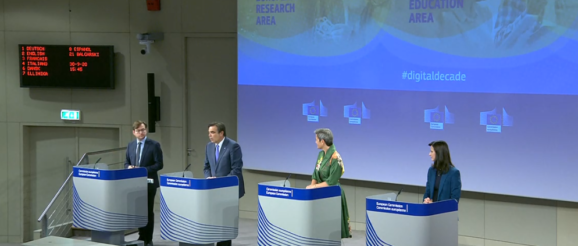Education, Research and Innovation for a new Digital Europe

On September 30th, the European Commission unveiled its plans for three long-awaited strategic proposals: on the , the , and the . The press conference was led by the interventions of Executive Vice-President Margrethe Vestager, Vice-President Margaritis Schinas and Commissioner Mariya Gabriel.
Executive Vice-President Vestager announced that the new Digital Education Action Plan (DEAP) will be implemented bearing in mind the multiple hard lessons drawn from the COVID pandemic, and is set to support Member States in the national plans. The LLLPlatform has extensively contributed to the , and we were pleased to hear that most of our points were taken on board; for instance, the DEAP will place great attention to the reskilling and upskilling for European citizens, aiming to equip them with digital skills and competences through education and training. In LLLP’s views, a substantial investment in education and in materials for schools is pivotal to sustain the digital transition: we were happy to hear the intention to make resources available for school infrastructures, but we hope to see funds destined to non-formal education centres as well (VET centres, adult learning centres, etc). To this extent, LLLP urges European institutions as well as Member States to remember that digital tools remain, in fact, “tools”: it is education that needs investments.
On this very note, Vice-President Vestager promised massive investment in teachers’ training, that we hold as a crucial brick to these aims. A final point, worthy of attention, is the idea to create a new certificate for digital competences at EU level: a welcome initiative, provided that it does not end up reinforcing the already-rampant tokenism of certifications and diplomas, which would eventually undermine the value of learning. If digitalising Europe is a necessity, making sure that social gaps are not widened by such digitalisation is a moral and political duty.
Vice-President Margaritis Schinas then announced that the European Education Area (EEA) was promoted for education to be seen not only as a means to get a diploma but rather as a vector for personal fulfillment and active citizenship: a vision that LLLP has long been promoting. The Communication on the EEA focuses on six dimensions: 1) Quality in education and training, 2) Inclusion and gender equality, 3) Green and digital transitions, 4) Teachers and trainers, 5) Higher education and 6) Geopolitical dimension. We were glad to hear that the new EEA will not only address formal education systems, but also support non-formal education. However, a more explicit reference to a lifelong learning perspective would have given a better blueprint to the strategy. Access to excellency should also be widened – as Commissioner Mariya Gabriel warned: to this extent, we would like to remind that excellency should not come at the detriment of inclusion and that the latter should be prioritised, especially in times where early school leaving figures remain high.
Last but not least, the Commission announced progress in the new European Research Area, and that research funds will be part of the recovery. An earmark of 5% of national schemes to be destined to joint action was announced. While this is undeniably a good aspect, it is important to reaffirm that research’s goal is to serve the society that produced it, not industrial interests as hinted in the presentation.
will shape the future of education in Europe for the years to come. At the end of the day, it’s education stakeholders and practitioners that will implement the measures promoted by the Commission. This press conference has brought reassuring news and the certitude that the European Commission knows its priorities; the Lifelong Learning Platform will be standing in the first row to make sure that promises of inclusion, investment and innovation are kept, and to provide a more in-depth analysis of the needs and perspective of learning.
The post Education, Research and Innovation for a new Digital Europe appeared first on Lifelong Learning Platform | LLLP.
